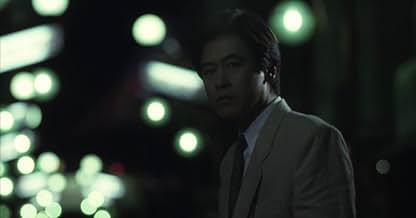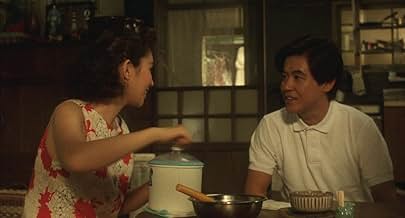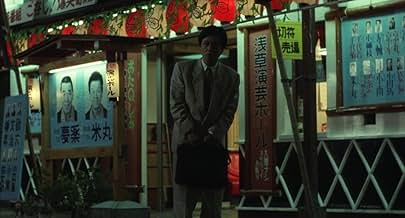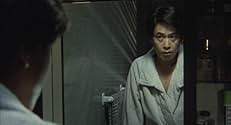Agrega una trama en tu idiomaA recently divorced writer is reunited with the ghosts of his parents who died when he was a boy. However, every time he sees them he loses more life energy. Now, he must choose between star... Leer todoA recently divorced writer is reunited with the ghosts of his parents who died when he was a boy. However, every time he sees them he loses more life energy. Now, he must choose between starting a new life or staying forever in the past.A recently divorced writer is reunited with the ghosts of his parents who died when he was a boy. However, every time he sees them he loses more life energy. Now, he must choose between starting a new life or staying forever in the past.
- Dirección
- Guionistas
- Elenco
- Premios
- 13 premios ganados y 11 nominaciones en total
Bengal
- Taxi Driver
- (as Bengaru)
- Dirección
- Guionistas
- Todo el elenco y el equipo
- Producción, taquilla y más en IMDbPro
Opiniones destacadas
This is probably the most subdued Nobuhiko Obayashi film I've seen so far (granted, we're only talking about six or seven movies), and it only has occasional stylistic flourishes that are reminiscent of his wilder/crazier films. I kind of liked him dialing it back for this story; the approach worked very well, though one nitpick might be some of the scene transitions where the image paused and awkwardly shrunk looked a little cheesy.
It was great to watch this fairly soon after seeing and loving All of Us Strangers, with both adapting the same source material in different ways. The premise and main four characters carry over in both, but there are enough interesting differences to make The Discarnates worth watching for anyone who liked All of Us Strangers, and vice versa.
The more recent adaptation of Taichi Yamada's novel Strangers probably affected me more emotionally, but I still found The Discarnates moving in parts and overall engaging, both for the familiar and unfamiliar beats contained within. It's very good, and I hope it gets a little more well-known in the wake of this newer adaptation (I didn't even realize the story of All of Us Strangers had already been made into a film, and maybe others are in the same boat).
It was great to watch this fairly soon after seeing and loving All of Us Strangers, with both adapting the same source material in different ways. The premise and main four characters carry over in both, but there are enough interesting differences to make The Discarnates worth watching for anyone who liked All of Us Strangers, and vice versa.
The more recent adaptation of Taichi Yamada's novel Strangers probably affected me more emotionally, but I still found The Discarnates moving in parts and overall engaging, both for the familiar and unfamiliar beats contained within. It's very good, and I hope it gets a little more well-known in the wake of this newer adaptation (I didn't even realize the story of All of Us Strangers had already been made into a film, and maybe others are in the same boat).
I love Obayashi because of Hausu... but after 5 watchings over a decade, I said - Let's see if he made anything else. And so far there are gems, middling... but the middling films float upward with reflection. My score is 8 of 10 here.
Fans of the hyper, superlative and surreal films like Hausu and Labyrinth of Cinema will not get their fill here.
But those who detect the underlying Japanese knack for subtle depths, for slow and calming profoundness, will be rewarded as the film ends.
I figured the pacing wasn't great as I watched - this film seems to tug at you but not make clear at ALL what it is doing.
Another review called the protagonist "bland" but I wouldn't say so. Without going Tom Cruise, there were a few moments that really moved me for this character - however certain elements are significantly underdrawn, and this is the inverted narrative of the film that feels like a pacing problem. The viewer is constantly getting pinged with a realization that they feel might have been made clear sooner. You think, even plain reality would have made this distinction apparent sooner.
But that is the nature of Obayashi. The films are highly imaginative and play chess against you with made up pieces and rules you never heard in your life.
We're all Netflix-minds now, but when this film came out I am quite sure it met its moment and bloomed exquisitely. So ultimately, this is not "we've been at the bars and we want a midnight movie!" material like Hausu. This is "Dinner was great and I want a kind of meditative, kind of underground-feeling art experience."
Enjoy - like I did!
Fans of the hyper, superlative and surreal films like Hausu and Labyrinth of Cinema will not get their fill here.
But those who detect the underlying Japanese knack for subtle depths, for slow and calming profoundness, will be rewarded as the film ends.
I figured the pacing wasn't great as I watched - this film seems to tug at you but not make clear at ALL what it is doing.
Another review called the protagonist "bland" but I wouldn't say so. Without going Tom Cruise, there were a few moments that really moved me for this character - however certain elements are significantly underdrawn, and this is the inverted narrative of the film that feels like a pacing problem. The viewer is constantly getting pinged with a realization that they feel might have been made clear sooner. You think, even plain reality would have made this distinction apparent sooner.
But that is the nature of Obayashi. The films are highly imaginative and play chess against you with made up pieces and rules you never heard in your life.
We're all Netflix-minds now, but when this film came out I am quite sure it met its moment and bloomed exquisitely. So ultimately, this is not "we've been at the bars and we want a midnight movie!" material like Hausu. This is "Dinner was great and I want a kind of meditative, kind of underground-feeling art experience."
Enjoy - like I did!
A lovely film. The performances by the high-quality cast are excellent and convincing. Kazama does a great job as the scenario writer who gets a second chance to spend time with his loving parents, who actually were killed when he was twelve. Yuko Natori is wonderful and sexy as his amorous neighbour who becomes his lover and confidante. Woven into the story is a lovely moral tale about a man who is a total failure as a person (though with a successful career) getting back in touch with his true feelings. Highly recommended.
Although 'discarnate' was a new word to me, I see it is defined in the dictionary as, 'disembodied', so although seeming a little clumsy as a film title, not totally inaccurate, although they probably should have stuck to the singular. I read 'Strangers' by Taichi Yamada, earlier this year and pondered how difficult it might be to film, not aware that it had indeed already been so filmed twenty years ago. The splendidly spooky book (Ijin-tachi to no Natsu, in the Japanese) was originally published in Japan in 1987 but only translated into English recently. The film itself is very faithful to the book and overcomes the difficulties I foresaw fairly creatively but mainly with the use of shadow. The middle section of the film seems a little flat, whereas in the book we are in the midst of deeply disturbing images both of the main character's deterioration and his friend's 'scars', the film plays this in a more straightforward manner. Nevertheless the film is well paced, has a warmth as well as worry to it and nobody could be disappointed by the rousing ending. A difficult book to adapt, but done surprisingly well.
The Discarnates is a very touching supernatural tale from director Nobuhiko Ôbayashi, who also gave us the hugely entertaining, crazy cult classic Hausu (1977).
The film's central character is recently divorced TV drama writer Hidemi Harada (Morio Kazama), who learns that his friend and work colleague is planning to date his ex-wife. Not in a good place, Harada is rather abrupt when his only neighbour, a lonely young woman named Kei (Yûko Natori), knocks on his door looking for company. He sends her packing.
The film then develops into a melancholy ghost story, as Harada decides to visit the place where he grew up, before his parents were tragically killed by a truck. Visiting a vaudeville theatre, the writer encounters his dead father and is also reunited with his mother. Over the following days, he spends time with his parents, experiencing much happiness.
Things are also going well for him at home: he apologises to Kei for his rudeness and soon begins a passionate affair with the woman, who is insecure about the burn scars that she has on her chest (meaning that Harada can only make love to her from behind!).
Eventually, Harada tells Kei about his trips to see his dead parents, something that alarms the young woman: she tells him that his visits are draining his lifeforce, and reveals to him his haggard reflection in a mirror. He must tell his mother and father that he can no longer see them or he will die...
Harada making the journey to the place of his childhood reminds me a lot of one of my favourite Twilight Zone episodes, Walking Distance, and like that story, the message in The Discarnates is 'don't live in the past, make the most of the present'. Through his experience with the ghosts of his parents, and his relationship with Kei, Harada comes to terms with his grief, learns to appreciate life and becomes far more content with his lot. It's heartwarming stuff, but Obayashi also has a surprise in store for the ending, which adds a touch of horror and plenty of gushing blood. I'm not going to ruin it for you but it's a lot of fun.
8/10.
Based on the 1987 novel Strangers by Taichi Yamada, which was also turned into the film All Of Us Strangers in 2023 (not seen that one yet -- I wonder how it compares...).
The film's central character is recently divorced TV drama writer Hidemi Harada (Morio Kazama), who learns that his friend and work colleague is planning to date his ex-wife. Not in a good place, Harada is rather abrupt when his only neighbour, a lonely young woman named Kei (Yûko Natori), knocks on his door looking for company. He sends her packing.
The film then develops into a melancholy ghost story, as Harada decides to visit the place where he grew up, before his parents were tragically killed by a truck. Visiting a vaudeville theatre, the writer encounters his dead father and is also reunited with his mother. Over the following days, he spends time with his parents, experiencing much happiness.
Things are also going well for him at home: he apologises to Kei for his rudeness and soon begins a passionate affair with the woman, who is insecure about the burn scars that she has on her chest (meaning that Harada can only make love to her from behind!).
Eventually, Harada tells Kei about his trips to see his dead parents, something that alarms the young woman: she tells him that his visits are draining his lifeforce, and reveals to him his haggard reflection in a mirror. He must tell his mother and father that he can no longer see them or he will die...
Harada making the journey to the place of his childhood reminds me a lot of one of my favourite Twilight Zone episodes, Walking Distance, and like that story, the message in The Discarnates is 'don't live in the past, make the most of the present'. Through his experience with the ghosts of his parents, and his relationship with Kei, Harada comes to terms with his grief, learns to appreciate life and becomes far more content with his lot. It's heartwarming stuff, but Obayashi also has a surprise in store for the ending, which adds a touch of horror and plenty of gushing blood. I'm not going to ruin it for you but it's a lot of fun.
8/10.
Based on the 1987 novel Strangers by Taichi Yamada, which was also turned into the film All Of Us Strangers in 2023 (not seen that one yet -- I wonder how it compares...).
¿Sabías que…?
- TriviaRemade as All of Us Strangers
- ConexionesFeatures Karumen kokyô ni kaeru (1951)
- Bandas sonorasO mio babbino caro
by Giacomo Puccini
Selecciones populares
Inicia sesión para calificar y agrega a la lista de videos para obtener recomendaciones personalizadas
- How long is The Discarnates?Con tecnología de Alexa
Detalles
Contribuir a esta página
Sugiere una edición o agrega el contenido que falta



















